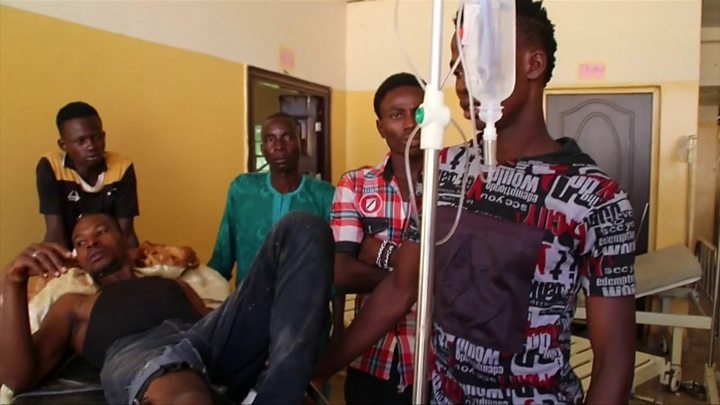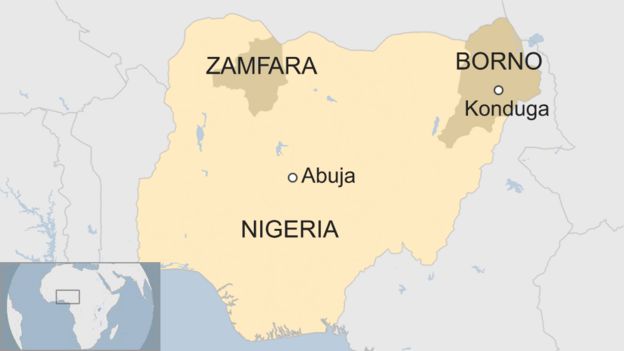Nigeria: 'Children used' as suicide bombers in Borno attack

Children were used as suicide bombers in a triple attack in Nigeria on Monday, Unicef has said.
Two girls and a boy carried out the bombing outside a video hall in Konduga village in north-eastern Borno State, the UN children's charity said. Their ages are not yet known.
Officials say at least 30 people were killed and 40 injured in the attack.
The bombing is believed to have been carried out by the Boko Haram jihadist group. It has not yet commented.
According to Unicef, five children have been used in suicide attacks since the beginning of the year.
In 2018, 48 children were used as human bombs in Nigeria, including 38 girls.
"Unicef appeals to all those involved in this terrible conflict to protect children at all times and to keep them out of harm's way," the organisation said.
- Africa Live: Updates on this and other stories from the continent
- Who are Boko Haram?
- The town that lost its girls
Formed in Borno State, Boko Haram has waged a brutal insurgency across the north-east for a decade.
As part of the ongoing armed conflict, thousands of children have been recruited and used by armed groups as combatants and non-combatants.
Unicef said girls are raped and forced to marry, with some becoming pregnant in captivity and giving birth without medical care.
What happened in the attack?
The blast took place outside a hall as a group of people gathered to watch television.
Ali Hassan, leader of a self-defence group in Konduga, told AFP news agency that the owner of the hall had prevented one bomber from entering.
"There was a heated argument between the operator and the bomber who blew himself up," he said.
Two other attackers who were nearby then set off their devices.
The number of casualties was high because emergency services arrived late at the site of the blast. They were not adequately equipped to deal with such a large number of wounded people, Usman Kachalla, head of operations at the State Emergency Management Agency (Sema) told AFP.
Video halls are common across northern Nigeria. They are usually rudimentary buildings where people pay a small fee to watch football matches or films.
Boko Haram has targeted them on several occasions, saying they are un-Islamic.

Konduga has been targeted before. In July 2018, eight people were killed after a suicide bomber detonated explosives in a mosque.
President Muhammadu Buhari has commiserated with the families of the victims and promised to bring the perpetrators to justice.
At least 27,000 lives have been lost and about two million people forced to flee their homes in the conflict with Boko Haram.

'Daunting and complex security challenges'

This latest attack came at the end of a bloody weekend in northern Nigeria. There is rising concern of insecurity in other parts of the country.
On Friday night an armed gang killed at least 34 people in the north-western state of Zamfara, which has been at the centre of a wave of attacks by bandits since the beginning of the year.
The Boko Haram insurgency has been terrorising people in the north-east for the past decade, and has been the main area of focus for Nigeria's armed forces.
But the triple suicide bombings in Borno on Sunday reflect just how complex the security challenges are.
The government has said that Boko Haram and the rival Islamic State of West Africa Province (Iswap) group are on their last legs. But both the military and population of the north-east continue to suffer regular attacks.
Although Boko Haram has lost a lot of the territory it held in the north-east in the last four years, it is still attacking soft targets in mosques, markets and public gatherings.
Combine this with the ongoing banditry attacks in the north-west, and kidnappings across the country's highways, and the scale of the security challenge is daunting.
No comments:
Post a Comment
Note: Only a member of this blog may post a comment.